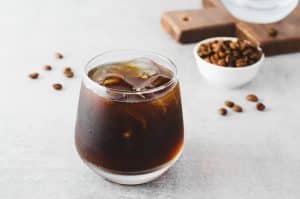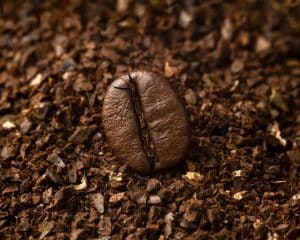Why Is My Espresso Bitter?

Did you just spend considerable time trying to make espresso but ending up with awful shots that you just can’t drink? I am guessing you are wondering why your espresso is bitter, and feeling like you wasted time. Now you have to make a trip to the coffee shop to get your morning caffeine.
Let me help you fix the problem.
There are a few reasons why your espresso could taste bitter and we are going to figure out which one is causing your not-so-great cup of coffee and get it resolved.
Reasons Why Espresso Gets Bitter
This sounds like a simple question, but it’s not as black and white as it may seem. Your espresso could be tasting bitter due to a few different reasons so let’s dive in and troubleshoot what might be causing you to not have the espresso you are dreaming of.
Over-Extraction
One of the main reasons why espresso is bitter could be that the coffee grounds were over-extracted. When coffee gets over-extracted, you have pulled too much of the flavor from the coffee grinds. Espresso is meant to be brewed very quickly so brewing it for too long can cause over-extraction.
You can also create over-extraction by having the wrong water-to-coffee ratio. If you are using an espresso machine, it is important to check your volumetric settings. This will ensure that you are getting the proper amount of water in your brew. It is also important to weigh your coffee grinds so you are not using too much or too little coffee.
Grind Size
Grind size is always one of the key factors in great coffee no matter what type of coffee you are brewing. The grind size in espresso is extremely important due to the way that the espresso is made.
Espresso is brewed very quickly, typically within 25 to 30 seconds. Due to this, espresso grinds are very fine. The finer that coffee beans are ground, the faster the extraction. This is due to the increase in the exposed surface area of the grounds. The water in an espresso machine passes through the grounds very quickly at high pressure, so you need finely ground beans in order to extract enough flavor.
If you grind your beans too coarse, you will not get enough extraction from them because the water will pass through too quickly; however, if you grind your beans too fine, you run the risk of over-extraction. It is important to get a precise grind and use a high-quality coffee grinder such as this Cuisinart burr grinder.
Clean Your Machine
Sometimes, you may be doing everything right. You are using the exact coffee to water ratio, grinding the beans to the perfect size, and your cup of coffee still just doesn’t taste right.
It is a good idea to check to see if your espresso machine needs to be cleaned. This is an importent step that gets forgotten about often. If you have not cleaned your machine in quite some time, it is probably time whether you have a high-end machine or you bought one on a budget. Waiting too long to clean your machine can result in the buildup of coffee residue as well as a buildup of coffee oils.
Even if you do not use your coffee machine every day, it will still build up oils and residue. Once these build up they can cause water to not flow through the machine properly, which results in extraction that will not be precise. Be sure to get on a regular schedule of cleaning your coffee machine to prevent buildup from ruining your espresso.
Use Fresh Beans
The best time period for using coffee beans is approximately 2 weeks after they have been roasted. If it has been a lot longer than 2 weeks then your beans are no longer fresh and this can affect the taste of your coffee.
Coffee beans need the proper amount of time to degas and oxidize, but you want to use them in the proper time frame because if you wait too long, they will be too oxidized and you will no longer get the proper flavor out of them.
Oxidation of Coffee Beans
As soon as coffee beans are roasted they are at the mercy of the environment including heat, moisture, and oxygen. The chemicals, acids, and oils in a coffee bean are known as solubles. As the solubles in the coffee beans start to oxidize, the coffee beans begin to lose their flavor and aroma. This is why if coffee beans sit for too long after roasting they will not have the same great flavor as they do when freshly roasted.
Degassing of Coffee Beans
Degassing is the release of gasses from coffee beans, and is the reason you want to wait approximately 2 weeks after roasting before grinding and brewing with them. When a coffee bean is roasted it builds up gasses, including carbon dioxide. A majority of the gasses are released in the days following roasting; however, if you use your coffee beans too soon after roasting, these gasses will create bubbles in your coffee brew.
Not only is it annoying, but the pockets of air can create gaps between the coffee grounds and water when it is brewed. This can lead to uneven extraction and potentially be the cause of bitter-tasting coffee.
The Scoop on Espresso
Espresso came to be one of the most popular ways to drink coffee due to a man named Luigi Bezzera. He wanted to find a way to make coffee faster and eventually created what we now call espresso.
Luigi Bezzera created the espresso in the early 20th century in Venice, Italy. After experimenting with several different ideas, he discovered that adding steam pressure sped up the process of creating coffee significantly and also created a much stronger brew.
Once Bezzerra created the new process, he began calling this new coffee machine his “Fast Coffee Machine.” The Italian word espresso translates to fast in English and that is where the name espresso comes from.
How Is Espresso Different from Other Coffees?
Espresso is very different from other types of coffee. It is a delicious coffee brew that can be drunk alone or used as a base for other specialty drinks such as lattes, cappuccinos, and macchiatos.
An espresso is a concentrated form of coffee that is stronger than traditional drip coffee. It’s made much more quickly, but has a very different taste than other coffee forms.
The method of brewing espresso is of Italian origin. Espresso is actually made using approximately 9 to 10 bars of pressure to force hot water through the coffee grinds. The texture of espresso is thicker than drip coffee and it will have a layer of crema on top caused by the air bubbles created by the steam and pressure mixing with the oils from the coffee bean. This crema is a foam that has a creamy consistency to it.
FAQs
Are there different types of espresso?
Yes, there are three different types of espresso. You can make traditional espresso, a ristretto, or a lungo. A ristretto uses only half the amount of water that a traditional espresso has, so it is even more concentrated. A lungo is the weaker of the three with twice the water of a traditional espresso. If you feel your espresso is too strong or weak, you can try changing it up and going the route of a ristretto or lungo.
Can you use any coffee roast to make espresso?
Technically yes; however, most espressos are made with a very dark roast coffee bean such as this Pete’s Coffee Dark Roast Espresso Bean. Espresso is known to be more concentrated and stronger so it is typically made with a strong, dark roast bean.
What causes espresso to taste sour?
Typically, an espresso is sour due to being under-extracted. This can happen for a number of reasons. You need to make sure you are using the proper coffee-to-water ratio to make your brew. If your coffee grounds are too coarse, you will get under-extracted and sour coffee. Check to be sure you are either grinding your beans fine enough or purchasing coffee grounds that are a fine grind intended for espresso.
Can you fix a bitter espresso once it is made?
If you have made espresso and it is bitter, there are a couple of things you can try if you do not have time to remake another one.
It is believed that a dash of salt can help to counteract the bitter taste. You can also try adding either creamer or sugar; this will help mask some of the bitterness and improve the taste if you do not want to waste the brew.
Now You Can Fix Your Espresso
Now you know what the main causes are behind your espresso tasting bitter and how to resolve the problems. It is important to use the proper ratio of water to coffee, the correct grind size, clean your machine, and use fresh coffee beans in order to set you up for the best-tasting espresso.
I hope you can get back to creating delicious espresso at home and not waste any more time on mediocre coffee!
Owen is a writer and editor at Caffe Streets who considers himself a coffee fanatic. He spends his time researching and testing different coffee beans and brewing methods and sharing what he learns with others.





